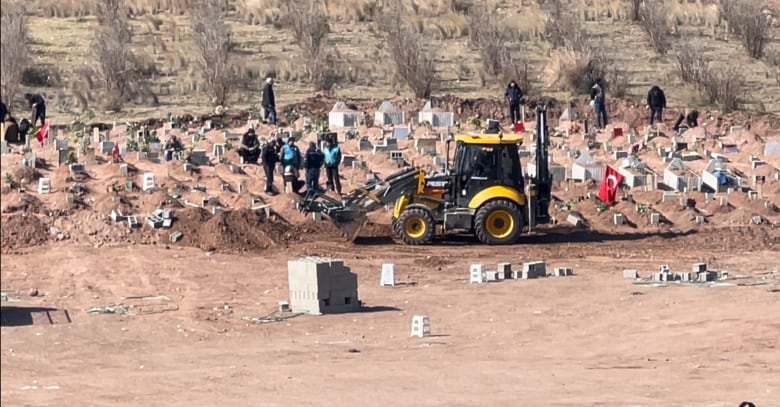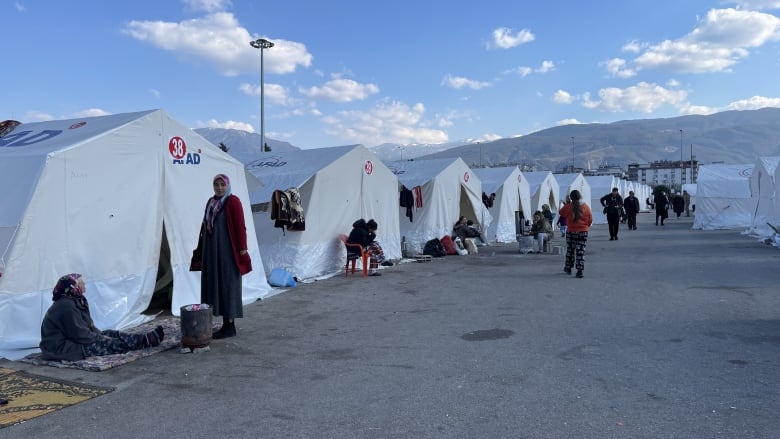For a lot of the previous week, the frantic work of rescuing people from the particles of Turkey’s earthquake appeared virtually delicate at occasions, with volunteers typically sifting by way of ruined buildings using solely their palms and shovels.
however inside the southern metropolis of Osmaniye, that routine ended this weekend.
instead, inside the historic central core, the place maybe 800 or extra people died in collapsed constructions, backhoes and huge industrial-sized diggers are using their monumental scoops to pour particles into dump vehicles and haul it away.
Gone are the quiet pauses to cease and hear for indicators of life from beneath.
Turkey’s submit-earthquake response has entered a mannequin new, grim and sure a lot angrier part, the place discovering and burying the ineffective is the precedence.
simply a few blocks away, on the metropolis’s freshly expanded cemetery, there’s an virtually meeting-line effectivity to the job. a quantity of white tents with gurneys inside are tended by masked volunteers in white hazmat matches and prolonged aprons.

beneath Islamic custom, the our bodies are faraway from the coffin and washed by volunteers earlier than being buried and wrapped in a shroud or blanket.
an infinite pile of disused coffins — probably a quantity of hundred — are left inside the parking lot, put aside to be reused to deliver extra our bodies to the makeshift mortuary.
CBC information was requested to not discuss to households or volunteers on the state of affairs, so as to not make their grief worse.
We have been allowed, however, to stroll by way of the cemetery, the place we noticed a newly ready subject, stuffed with numerous up up to now graves and a backhoe piling filth over the newly buried.
Survivors face difficult months forward
By the terrible requirements of final Monday’s twin earthquakes in southern Turkey and northern Syria, Osmaniye escaped the form of catastrophic damage that simply about annihilated such cities as Antakya and Kahramanmaras.
Nonetheless, the survivors now face prolonged and troublesome months forward.

subsequent to the Masal amusement park, a quantity of presidency and non-authorities organizations have arrange a discount centre with tons of of tents and stalls, and volunteers offering sizzling meals.
“individuals are stuffed with fear,” acknowledged an administrator, who did not should be named as he was unauthorized to discuss to overseas journalists.
it is the form of fear that comes with having your every day routine completely dismantled and all of your assist purposes disintegrated, he defined.

He acknowledged some households are settling in for what may very properly be months on the camp, whereas others plan to maintain solely prolonged ample to make preparations to stay with relations in completely different cities.
“I hope nobody else on the earth ever has to witness such a disaster,” acknowledged Ibrahim Ergen, who till the earthquake hit labored at an space Osmaniye restaurant as a driver delivering meals.
“The restaurant is now beneath the rubble. i would want to try to search out one other job, so let’s look at,” he acknowledged.
a quantity of males on the humanitarian centre acknowledged they plan to maintain round as a end result of they think about the federal authorities of President Recep Tayyip Erdogan will quickly launch a rebuilding advertising campaign and that they’re going to get some form of labor in constructing.
Destruction in Antakya
a minimal of in Osmaniye, it is potential to ponder buildings being repaired and companies reopening.
however, in completely different parts of the earthquake zone that CBC information visited over the previous week, it is arduous to think about a rebuilding effort starting quickly, if ever.
In Antakya, the capital of Hatay province shut to the border with Syria, it appeared as if virtually every constructing inside the metropolis suffered important damage — and virtually every construction inside the metropolis centre was both unlivable or had collapsed utterly.
On Ataturk avenue, condominium block after condominium block toppled over sideways, falling on every completely different and triggering a collection response like a row of toppling dominoes.
With lots of these 12-storey buildings now pancaked into three or 4 metres of pulverized concrete, nobody may ever know what quantity of people have been asleep inside when the quake hit and have been killed.
“it is tragic,” volunteer Evrim Çakir acknowledged as she struggled to maintain her composure whereas co-ordinating meals and shelter for people at a camp on Antakya’s riverbank.
“mates and kinfolk of every particular person you see listed right here are beneath the rubble,” she acknowledged, motioning to the tons of of people on the camp who immediately turned homeless.
She acknowledged what worries her in all likelihood the most is the metropolis’s sanitary state of affairs — and notably the affect that is having on the psychological well being of ladies.
“we haven’t bought any transportable bogs, and current ones are unusable,” Çakir acknowledged.
“ladies cry whereas asking for underwear or sanitary pads — having to ask [a stranger] turns it into one factor traumatic.”

additionally offering assist on the humanitarian centre is Dr. Metin Budak, who practised remedy for 39 years in Antakya, earlier than the quake destroyed his clinic and killed lots of his workers members.
Like virtually everyone CBC information spoke to inside the metropolis, Budak has been sleeping outdoors or in his automotive for the previous week.
“individuals are in deep shock,” he acknowledged, including that he worries the anguish — and anger — of survivors is about to get a lot worse.
“the true psychological collapse will come after the shock wears off,” he acknowledged.
When Budak was requested about his personal state of affairs — and the destiny of the workers at his clinic — he acknowledged he may not discuss about it and wiped tears from his eyes.
‘I’ve seen issues I want I may unsee’
simply throughout the nook from the tents on the riverbank, as many as one hundred rescuers, collectively with a workforce from Bosnia, have been persevering with to make decided efforts to free dozens of people who have been believed to be inside a 12-storey condominium constructing when it collapsed.
amongst them was Ozgur Kesici’s mom, who spoke to CBC information as he watched the rescue try.
“Now i do not really feel something,” he acknowledged of watching his childhood dwelling crumble and the neighbourhood he grew up in smashed into objects.
“I’ve seen issues I want I may unsee. I felt issues I want I may un-really feel. I simply do not really feel something for the time being.”
Kesici acknowledged his mom was dwelling alone inside the condominium, and although there was no signal of her, searchers found simply a few of her belongings — collectively with a bottle of Heineken beer, engraved collectively with his identify on it, that he saved at her dwelling.
additionally they found a quantity of photos of mom and son collectively that she had apparently put up on a wall.
Kesici had been working in a finance job in Germany and returned to Antakya after the earthquake.
The worst, he acknowledged, is that he can’t complain about his loss to people he is aware of inside the metropolis as a end result of they’re dealing with their very personal grief.
“Half the neighbourhood, maybe better than that, is simply powdered. Whoever i am talking to, my mates, my childhood mates or anyone else, everyone has their very personal ache.”
not like in Osmaniye, the place toughing it out for a quantity of months may even be an possibility, that is possible not potential in Antakya. Too many fundamental providers are gone.
the one major freeway out of the metropolis has been jammed with site visitors for days, with an exodus of people attempting to get out.
Budak, the doctor on the riverbank humanitarian centre, acknowledged he feels as if Antakya’s 2,000 years as a thriving place of commerce and tradition may even be over.
“i am afraid it would show to be a form of ghost metropolis.”



0 Comments